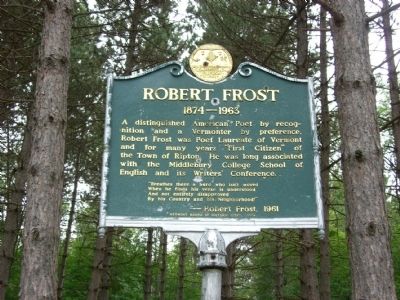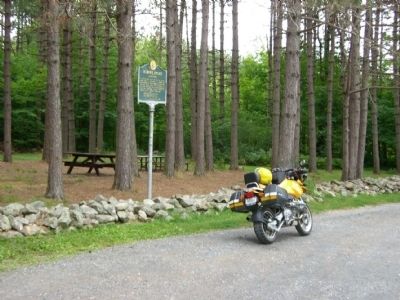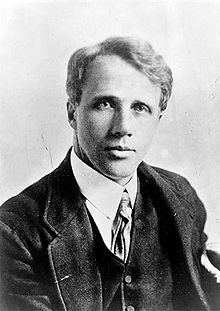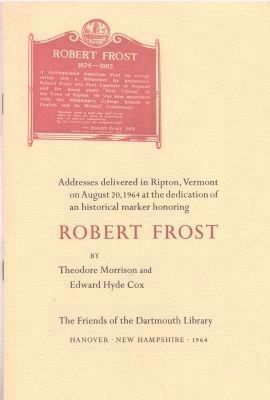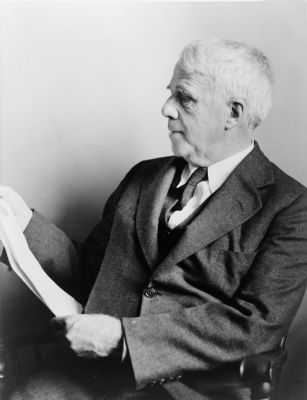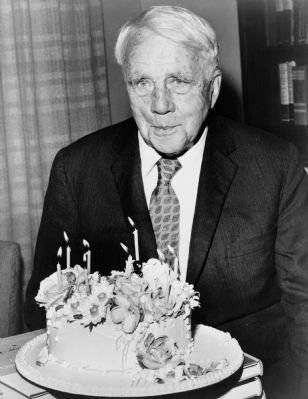Near Ripton in Addison County, Vermont — The American Northeast (New England)
Robert Frost
1874 - 1963
A distinguished American poet by recognition and a Vermonter by preference, Robert Frost was Poet Laureate of Vermont and for many years “First Citizen” of the Town of Ripton. He was long associated with the Middlebury College School of English and its Writers’ Conference.
“Breathes there a bard who isn’t moved
When he finds his verse is understood
And not entirely disapproved
By his Country and his Neighbourhood?”
— Robert Frost, 1961
Erected 1964 by Vermont Board of Historic Sites.
Topics. This historical marker is listed in these topic lists: Arts, Letters, Music • Education. A significant historical year for this entry is 1961.
Location. 43° 57.48′ N, 73° 0.419′ W. Marker is near Ripton, Vermont, in Addison County. Marker is on Vermont Route 125 just west of Frost Road, on the left when traveling east. Touch for map. Marker is in this post office area: Ripton VT 05766, United States of America. Touch for directions.
Other nearby markers. At least 8 other markers are within 9 miles of this marker, measured as the crow flies. The Ruth Stone House / Green Apples (approx. 7.2 miles away); The Corner School (approx. 8.2 miles away); Birthplace of Ray Fisher (approx. 8.3 miles away); The Addison County Courthouse (approx. 8.8 miles away); Middlebury War Memorial (approx. 8.8 miles away); Court Square (approx. 8.8 miles away); Middlebury Civil War Memorial (approx. 8.8 miles away); Charter House (approx. 8.9 miles away).
More about this marker. The marker is located in a parking/rest area off the main road.
Additional commentary.
1. Text of Marker Dedication Booklet
Addresses delivered in Ripton, Vermont, on August 20, 1964, at the dedication of an historical marker honoring Robert Frost, by Theodore Morrison and Edward Hyde Cox.
Published by the Friends of the Dartmouth Library, Hanover, New Hampshire, 1964. [No copyright statement found on booklet.]
This publication was made possible by an anonymous gift to The Friends of the Dartmouth Library, December 1964
The addresses by Professor Morrison and Mr. Cox have been slightly revised from their texts as originally delivered.
A CITIZEN OF RIPTON
We have all heard that seven cities claimed the honor of being Homer's birthplace. Ripton, Vermont, certainly cannot claim to be the birthplace of Robert Frost; that distinction belongs unequivocally to San Francisco, at the other verge of our continent. We must begin by acknowledging that there is a great deal of Robert Frost's life to which Ripton can make no claim.
His boyhood years, from about the age of eleven on, were passed in New Hampshire. In New Hampshire he farmed, taught school, and wrote his first poems. In New Hampshire he married Elinor White, who died in Gainesville, Florida. He was a student briefly at Dartmouth College and later, for a slightly longer period, at Harvard College. At neither did he stay long enough to take his degree. His first solid literary success, the publication of A Boy's Will, the major inaugural step in his career as a poet, occurred during an extended visit to England beginning shortly before the outbreak of the first world war.
Before Ripton became his permanent summer home during the later years of his life, and finally his legal residence, he had lived, to mention only a few of many places, at Derry and Franconia in New Hampshire, at Ann Arbor in Michigan, at Key West and South Miami in Florida, at Amherst, Boston, and Cambridge in Massachusetts, at South Shaftsbury in Vermont. He became a familiar figure, through his public readings, in virtually every state of the Union and, it sometimes seemed, on almost every college campus in the country.
But though it is only fair to recognize that the share of Frost's years and activities that Ripton can claim is limited, that share is nonetheless rich, extensive, and important—indeed, climactic—in the span of his long career; so that it is eminently fitting that Ripton should pay tribute to his presence here by the historic marker we have met to welcome to its place in our landscape today.
So far as I know, Frost first appeared in Ripton back in the twenties in connection with the Bread Loaf School of English and the Bread Loaf Writers’ Conference of Middlebury College. To both these enterprises he was a patron saint and an inspiriting, often provocative presence, taking part in their annual sessions, with very few intermissions, right down to his last year, and not only enlivening their public programs but influencing them in formative ways behind the scenes. It was in 1939, a little over a year after the death of Mrs. Frost, that he bought the Homer Noble Farm, and thus began his continuous summer residence at Ripton for the remainder of his life.
Perhaps a somewhat personal word of explanation is inescapable at this point. In 1939 I had been serving as Director of the Bread Loaf Writers' Conference for some seven years, and was to go on acting in that capacity for another sixteen. I was also teaching on the faculty of the School of English. Mrs. Morrison and I had two young children to bring up. We wanted the freedom and naturalness of the country for them for as much of the year as possible—fishing, riding, acquaintance with the woods, with animals, with haying and berry picking and swimming. Mrs. Morrison had become Mr. Frost's secretary, and much more than secretary in any ordinary sense. She not only arranged and kept his lecture and travel schedule, typed his letters and the manuscripts of his books, but listened to him while he fought his endless spiritual battles with himself, watched over his health, driving him to the Hanover clinic when necessary, and in general provided him with a stabilizing sympathy and understanding in the devastating years after Mrs. Frost's death. Her success over many years in this delicate and arduous enterprise is attested by his continued productivity as a poet and by the dramatic recognition he and his work received during the later decades of his life, recognition that reached a climax for him in his appearance at President Kennedy's inauguration.
Out of all these circumstances grew the summer association of the Morrisons, older and younger, with Robert Frost. At the Homer Noble Farm we came to live as a joint summer family, Mr. Frost playing the role of sometimes formidable but always affectionate and concerned grandfather to our children, and all of us sharing in the activities and responsibilities of the operation. If Ripton takes a justifiable pride in counting Robert Frost among its citizens, I am sure you will allow me to say that some of its gratitude should be extended to Mrs. Morrison as an indispensable link in this chain of association.
Robert Frost's name will always be connected with Ripton, but I wonder whether some of you are asking yourselves just what Frost did here? Well, during the summers and for short visits at Thanksgiving and Christmas he lived here. Life, to such a man and such a poet, is itself a complicated and awesome business. I think Ripton was a place of refuge and restoration to him, where he could recover his spiritual tone after his often exhausting winter lecture tours, where he could renew his acquaintance with the "country things" he speaks of in one of his poems, things he never ceased to love and need, though he was a citizen of the world and came to be as much at home in cities and capitals as he was botanizing in woods or meadows. I think it is significant that it was from Ripton he went and to Ripton he returned on four of his notable late-life journeys to receive honors or to conduct those one-man cultural exchanges that gave citizens of other lands a fresh conception of the dimensions that American character can attain.
From Ripton he flew as a delegate sent by the State Department to the World Congress of Writers at Săo Paulo, Brazil, and to Ripton he came back. From Ripton he went to England, again on a good will mission for the State Department, and received honorary degrees from Oxford, Cambridge, and the National University of Ireland. Again he went from Ripton to Israel, as the Samuel Paley Foundation Lecturer at the Hebrew University in Jerusalem, and he spoke and read at Athens in Greece before again returning to Ripton. The same litany applies to his last and perhaps most dramatic journey of all, to Soviet Russia. From Ripton to his bedside interview with Premier Khrushchev, and to Ripton back again! Evidences of the respect and friendship he evoked in Russia, respect and friendship for his character as a man, an artist, and an American, continued to reach this country, as Mrs. Morrison can testify, to and beyond the hour of Frost's death.
But I have been lured off into mentioning some of the more spectacular expeditions that Frost made from Ripton as a base. What did he do in Ripton? For a time he kept cows and chickens. Always he saw to it that a vegetable garden was planted, and he watched over his corn and his pole beans, his peas and his squash with a paternal, knowing, and anxious eye. Physically tough and vigorous as he was in his prime, he couldn't do all the manual work himself. He had to call on help to mend fence, plough, get the hay in, build stone walls, dig springs, and repair the barn. Out of the series of helpers he employed I must mention by name, for his many years of association with us all, our friend and neighbor Stafford Dragon.
What besides live, go on missions and return, raise vegetables, walk in the woods and fields and note with his learned botanical eye the varieties of flowers, trees, mosses, and ferns? Well, Frost talked to all hours of the morning with all manner of visitors: teachers, pupils, other poets, people who wanted to write books or articles or interviews about him, friends, strangers who came from near and far to see and converse with a man known to be remarkable and reputed to be wise and great (some, for example, from as far away as Nehru's India).
It would be hard to suggest the range and variety of things Frost found to do in Ripton. But we must not forget that he was always and incessantly a poet. The durable importance of his life to the world will always lie in his poems. And in Ripton he wrote poems. It may not be as easy as it might seem to say just what poems he composed here, for often those that only reached print in his later volumes were written or begun many years before. But during his Ripton years he brought out no less than five volumes containing much of his most mature and memorable work: A Witness Tree, A Masque of Reason, Steeple Bush, A Masque of Mercy, and the last volume of all, In the Clearing.
That we may remember him as a poet, and remember that he was a poet in Ripton as in all the other times and places of his life since boyhood, I shall conclude these remarks by reading you one of his poems, quite possibly though perhaps not certainly written here in Ripton. I am only sorry he is not here to read, in the voice that he alone could bring to it, a poem he alone could write.
—THEODORE MORRISON
[Here followed a reading of the poem "Choose Something Like a Star"]
BEYOND THE WHITE MOUNTAINS WERE THE GREEN
It is an honor to participate anywhere in a memorial to Robert Frost. For more than one reason I am especially pleased to have been asked to speak here in this town and this state. What I have to say will be quite personal.
When I first came to Ripton about twenty-five years ago to visit Robert Frost I joked with him rather proudly about being more of a Vermonter than he was. My ancestor Jedediah Hyde founded the town of Hyde Park, Vermont; and the town was named for him. His son, Jedediah, was a member of the legislature and built the log cabin about 1783 that still stands at Grand Isle. His great-grandson, Edward Hyde, born at Grand Isle, was my grandfather. And I was closer to him than most people are to their grandfathers, because my mother (who was his only child) died when I was five years old and after that he brought me up. My grandfather had left Grand Isle when he was twenty to seek his fortune, but he never tired of praising his native state.
Like many other Vermonters I have known, my grandfather had something of the poet in him—hidden under the reticent exterior of a hard-headed, practical man of business. He entertained my childhood with stories of his childhood in Vermont; and his stories were made of better materials than mere anecdotes and facts. They were full of poetry and romance and gave me an early taste for literature, and an early taste for these mountains and the Champlain Valley below.
My roots, you see, are in Vermont; but my own visits to Vermont have been mostly to Robert Frost, and because of him. In the later years of my visits he used to do my bragging for me. He would say, ‘Hyde is really more of a Vermonter than I am.’ And he would ask people if they had seen the log cabin my grandfather (five generations back) built at Grand Isle.
Mr. Frost admired the men—like your ancestors and mine—who came here when Vermont was a beautiful wilderness waiting to be farmed and peopled. But he had his own way of peopling wildernesses. His poems have deep things to say about people not only in the Green Mountains, but wherever they may be.
Mr. Frost, of course, was not a native of Vermont at all. He was born in San Francisco and died in Boston. As poet and public figure he belonged, even before his death, to his country—all of it—rather than to his village or state. He was not a native of Vermont: he adopted it. And sometimes what a man adopts is more deeply his own than what he was born to.
You will hear many accounts of him, and they will not altogether agree: he was not a simple man. But they will almost all agree that he was a big man and not easily contained by walls or fences. No parish was big enough for his spirit. He was not parochial, but he was partisan: he was devoted. He said about himself that he had “passionate preferences,” and although he appeared to be at home almost anywhere, one of his passionate preferences was Vermont.
For the last twenty-five years of his life Ripton was most his home, and it was the place, I think, that he cared for most of any place on earth. However, places were not for him the heart of the matter. I remember one fine evening with him up at the Euber place, watching the sun set over the Adirondacks. I was praising the beauties of nature—and of Ripton in particular. He agreed with my praise politely but added, “In all the moves I’ve made in my life from one place to another, I’ve never moved to a place because of the place: it has always had something to do with people.” Any of you who knew him well will not be surprised that he put people first.
In the years he lived in Ripton he lived also in a larger world. He was a friend of more than one President of the United States, and he was acquainted with most of the great names of his time. But I am sure he was no more personally concerned with these names than with the names we know so well here in Ripton. His curiosity and his affection were constant. He cared just as much what happened to people here—and especially to certain people (I could name them, and some of whom are here today)—as he did about what happened to poets or Presidents.
But although people came first, he did also care about the beauty of nature. I have travelled with him all over this state, and I know how much he enjoyed it. His favorite ride of all was what he named "The Balcony Road." That is the road, of course, here at the corner that runs uphill out of Ripton and goes to Bristol by way of Lincoln. Times beyond counting I have driven him over this road in the late afternoon. The view of Lincoln Mountain from the moment it first appears to the moment it is lost, when the road drops down into the valley, never failed to arouse his emotions—and mine. He thought this might be the most beautiful drive in the world. And I think perhaps it is.
Mr. Frost was, above all else, the poet. Natural things, like mountains, had larger meanings for him than for most people: mountains were metaphors. He wrote once, "... beyond the White Mountains were the Green; beyond both were the Rockies, the Sierras, and, in thought, the Andes and the Himalayas—range beyond range even into the realm of government and religion." Years after he wrote this he actually saw the Andes—not just in thought.
Many of you will remember that he made his first flight when he was eighty years old. In the summer of 1954 he flew to Brazil for the United States Government. And later flew from Brazil over the Andes to Peru on his way home. (Although he travelled a good deal in the end, he was never a traveller at heart. He did not depend on romantic places or strange adventures for what he had to say about life.) When he returned from this first flight I hastened to Ripton to hear what he might have to tell. I found he had rather little to say about the sights of South America. When he spoke of having flown over the jungles and the great Andes and I pressed him to tell me what all that looked like from the air, he dismissed the whole continent by saying, “Oh, I dunno; just about like Vermont.”
He understood very well the reticence of New England. But it is hard to be reticent in speaking of him today. I take it hard that he is not here to speak once more for himself.
I think he didn’t want the Andes to be any better or any more beautiful than the Green Mountains—and they aren't. And for us they never will be—partly because of him.
For years I used to visit alone with him here in the fall; and when —after a few days or a week—I would have to go home, he always insisted on driving with me to the foot of his road and walking back. But when we reached the foot of the road from the Homer Noble Farm, he would postpone the moment of parting; and we would stand there and talk—sometimes for a long time. Parting from him was always hard, and we both felt, I know, that partings are rehearsals. Our last parting, it turned out, was in Boston—not here. But I will always remember him standing there—near the spot where your memorial to him now will be—where so often we tried to postpone the inevitable farewell.
Parting from these hills is full of memories for me, and it is still hard for me to leave them. From Lincoln Mountain I am reluctant to part, and my memories tell you why.
Not far from where we stand at this moment—almost in sight of this church—there is a mountain named for Robert Frost. I am glad that it is in Vermont, and I am sure he was glad too.
From Mount Robert Frost I cannot part—nor will you: nor will any of us, I suspect, in the strange centuries that lie ahead. His voice will be heard, his words will be read, by people almost everywhere long after we are gone. Whatever faults we might have found in him (those of us who are still here to speak of him as a friend or as a neighbor) will seem small beside the memory of the brave man and beside the monument of his poetry: beside the mountain of his name.
Vermont and Ripton have reason to be proud of him: his presence has made an historic site. The memorial you are dedicating today is indeed in the right place. It means, for one thing, I think, that Vermont has adopted him—as he, long ago, adopted Vermont.
—EDWARD HYDE COX
Remarks of Mr. Billings in accepting the Robert Frost Historical Marker on behalf of the town of Ripton
Mr. Chairman, honored guests, friends of Robert Frost, and friends of Ripton: Several years ago, when Robert was still with us, I composed a short piece of verse and dubbed it “Ripton.” A few of those present have heard this, but most of you probably haven’t. I would like to recite it to you now. It goes like this:
Ah, the little town of Ripton
Up near the mountain top
Where city folks come and go
And for a short time stop.
To view the mountain scenery
And breathe the mountain air
And wonder at us simple folks
Who get our living there.
It is Robert Frost the poet
Put Ripton on the map:
While others we are proud to know,
He is our leading champ.
Tho’ our esteem for others grow
None shall go above him
For he loves man and nature so—
That is why we love him.
I believe this little jingle expresses quite well the feelings of Ripton people toward Robert Frost. Because Mr. Frost spent so much time here the last years of his life, we had an exceptionally good chance to know him, not only as a poet, but as a man—a fellow human being like ourselves. And those who knew him best loved him best.
So we have very good reason to be grateful to those agents of our state and national government who have so kindly and generously joined with us in establishing here a permanent memorial to Robert Frost as a resident of this town. Time may well prove this to be the most significant single event to take place in the entire history of our town.
In behalf of my fellow townspeople, I extend to all who have had a part in bringing this to pass our heartfelt thanks.
Order of Exercises — Ceremony of Dedication, August 20, 1964
William Hazlett Upson of Middlebury, Vermont, presiding
1. Invocation—Rabbi Victor E. Reichert of Cincinnati, Ohio
2. Welcome—State Senator Irving Eastman of Whiting, Vermont
3. Musical Interlude—Mrs. Dorothy Voss, vocalist of Bloomfield, New Jersey; Mrs. Sylvia Frost Jones, organist of Calgary, Alberta
4. Guest Speaker—Prof. Theodore Morrison of Cambridge, Massachusetts
5. Remarks—Mr. Paul Newcomb Supervisor, Green Mountain National Forest
6. Special Speaker—Mr. Edward Hyde Cox of Manchester, Massachusetts
7. Musical Interlude—Mrs. Voss and Mrs. Jones
8. Presentation of Marker—Mr. Richard G. Titus Supervisor, Vermont Board of Historic Sites
9. Unveiling of Marker—Miss Debbie Atkins of Lynnfield, Massachusetts
10. Acceptance of Marker—Mr. S. Jason Billings of Ripton
11. Benediction—Rabbi Reichert
(1 through 7 in the Ripton Methodist Church—8 through 11 at the Marker)
— Submitted October 23, 2013.
Credits. This page was last revised on November 4, 2020. It was originally submitted on October 22, 2010, by Kevin Craft of Bedford, Quebec. This page has been viewed 1,723 times since then and 64 times this year. Photos: 1, 2. submitted on October 22, 2010, by Kevin Craft of Bedford, Quebec. 3. submitted on October 28, 2010. 4. submitted on October 23, 2013. 5. submitted on October 23, 2013, by J. J. Prats of Powell, Ohio. 6. submitted on October 23, 2013. • Syd Whittle was the editor who published this page.
